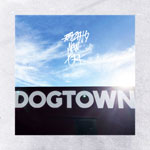
![]()
![]()
![]()
![]()
4 out of 5
I should confess my biases first. Facing New York’s 2005 debut was a pivotal album in the formation of my music taste. The heavily textured, rhythmically unpredictable, emotionally charged 10 songs on that self-titled record drew from everything from 70s prog to post-rock to early-2000s post-hardcore and assembled it all into a what I would consider a flawless record. It became the soundtrack to my college-years anxieties and probably remains among my all-time top five albums. Filming those early Facing New York shows with a single crappy miniDV camera and posting the grainy, noisy results to 2005 YouTube was one of the things that gave birth to this very website.
When the band’s keyboardist and second guitarist departed in the following years, Facing New York’s sound changed radically and the followup album, Get Hot, was somewhat of a shock to the system. The Rhodes-driven bombast, call-and-response vocals, and effects-soaked guitar interplay of the band’s debut was replaced with shorter, more direct songs, gritty lo-fi riffing, sparser arrangements, and more direct, literal lyrics. Get Hot was a good record, but it was the product of band in transition, trying to find its voice amid a major restructuring. Some of its songs had been performed live with old members and their absence was noticeable on the record. While home to some undeniable classics of the band’s catalogue (“All A This”, “Gesture” and the snarky but biting commentary of “Cops On Bikes”) the album as a whole failed to make the same impact. After extensive touring for it, the band largely fell silent.
The three remaining members, now scattered across the western United States have moved on to very different adult lives, with only frontman Eric Frederic (now better known as Grammy-nominated producer Ricky Reed) still fully immersed in the music industry. The intention to put out a new record was announced as far back as 2010, but as the years went by with no news it became reasonable to conclude that day would never come. Then suddenly, late this year, the band resurfaced on social media. It’s Wikipedia page reappeared. We started seeing teaser teaser videos from nearly decade-old studio sessions in California’s secluded far north and more recent ones behind a massive mixing desk in Los Angeles. And in November, the driving, polished album cut of lead single and title track “Dogtown” made its debut, the fully realized incarnation of what started as a shaky live jam around 2009.
After peppering out about half of the album track-by-track over a few weeks, the record was officially released on Friday, December 14, coinciding with a show at San Francisco’s Bottom of the Hill, a favorite venue for the band when it was rooted in the Bay Area (they had previously played a warm-up show earlier in the week in LA). The band, joined by guitarist Nate Mercereau, tore through the finished versions of nearly a decade of work, loud, loose, and locked-in to the grooves underlying their long-gestating new material. With the exception of a couple of Get Hot favorites, the night was dedicated to the Dogtown material, and they sold it well.
Dogtown is hard to nail down stylistically, perhaps because it is less of a snapshot of the band at one time as the previous two releases were, and rather the product of a long hiatus, worked on sporadically amid geographic, career, and life changes. The album is on the whole much more guitar-focused and heavier on riffs than its predecessors—keyboards and synthesizers are mostly absent, as are most of Get Hot’s dalliances with funk and afrobeat rhythms. At several points Frederic and bassist Brandon Canchola seem to channel Zeppelin or Sabbath with the straightforwardness of what they’re playing, at bit jarring for anyone expecting the next “Styrofoam Walls” or “Comin’ Up.” Such simple but effective grooves dominate the record’s first half in particular, where the latter songs give themselves more room to breathe and explore. Frederic’s decade of successful work as pop and R&B producer has noticeably informed his writing—the first lines of the opening title track immediately reveal that his time behind the board for high-profile pop and R&B acts has rubbed off on his own vocal delivery. As the record moves ahead it weaves through straightforward Weezerish pop-rock (“Gods of the Good Shit”), Radiohead-esque subtlety (“Birth of Venus”), fuzzed-out guitar jams (“Heaven Is High Hell Is Low) and mathy proto-metal (“Shame”). The band explains that while the foundations of many of these songs go back to the days of touring for Get Hot (earlier versions of “Dogtown” and “Shame” were staples of their last few shows before their hiatus), the lyrics and vocals were finished within the last few months, drawing on the decade of life experience during their absence. The largely autobiographical themes of new love, new fatherhood, and gentrification permeate the final versions of the lyrics, and though Frederic says they were finished at the last minute, they exude sincerity and thoughtfulness.
“Dogtown” is out now. It’s been ours for a long time, and we couldn’t be more excited for it to finally be yours. If you’re in SF, come celebrate with us tonight at @bottomofthehill.https://t.co/qU1k1woB76 pic.twitter.com/3KPqP2FpT4
— Facing New York (@facingnewyork) December 14, 2018
Frederic co-produced Dogtown with the band and released it on his own Nice Life label, and his professionally honed production skills shine throughout the album. Whereas Get Hot felt noticeably, intentionally gritty and minimalist, Dogtown is less hesitant with overdubs, sporadic but rich vocal harmonies, and varied guitar tones. The vibe of the record varies from song to song, and the production adjusts to compliment the myriad directions the songs explore. It’s light where it needs to be, thick where it needs to be, expansive where it needs to be. The closer, “Your Love”, stands apart from most of the record, full of textural changes, multiple sections, and a climax of overlapping guitars. It’s probably the closest the band has come to the sprawling feel of its debut LP in years and is a welcome gift to those of us who fell in love with their music in that era.
From the spastic progressive post-hardcore of its early EPs to the grandiosity of its debut album to the stripped down grooves of Get Hot to Dogtown, Facing New York has been a band characterized by constant change and willing to challenge listeners’ expectations with each new project. Dogtown borrows a little from each of their past incarnations and holds enough familiar elements that longtime fans will recognize them instantly when they happen (a couple of Omar Cuellar’s drum fills put an immediate smile on my face on the first listen). But much of the material here is new sonic territory, to an extent that the band flirted with the idea of releasing the record under a different name. The overt accessibility of many of the new songs, especially in the first half of the record pose a challenge to fans that want them to shred like the old days. But the hallmarks of what have always made Facing New York a great and unique band—their lyrical honesty, their unconventional but remarkably good rhythm section, and their willingness to adapt and evolve remain intact. It’s good to hear from them again.

